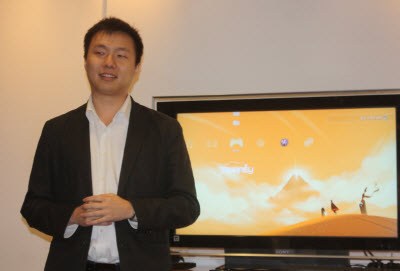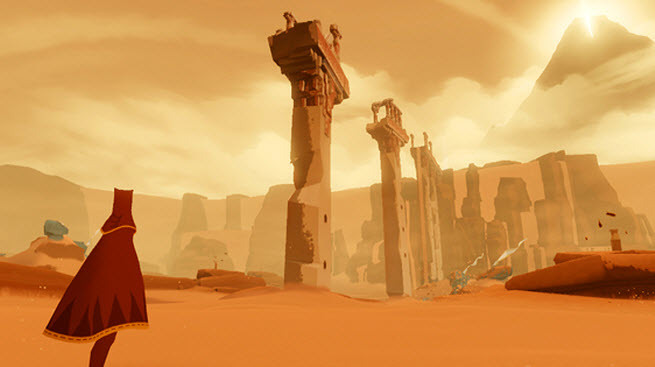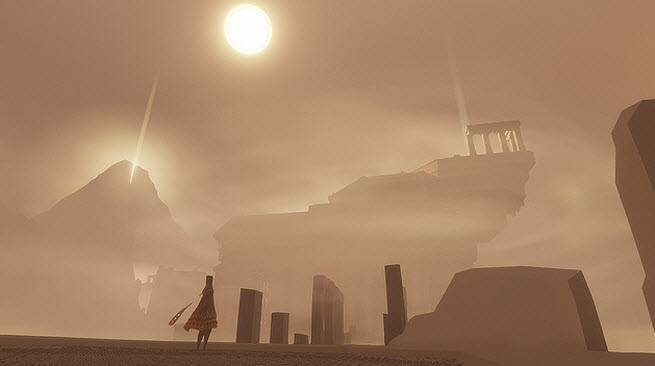GamesBeat: In the recap of your talk, it sounded like everything you do is in service to the game. I’m assuming that team size is part of that. After you finish a game, though, and you have a team put together, does the next project have to be something that needs at least that many people?
Pavlovic: If you look at the projects from thatgamecompany, they’ve always gotten slightly more ambitious and taken slightly longer each time. The team size has grown in an organic way. We’re continuing to hire now. We have 15 people, which is larger than the team has ever been. It’s not huge by any means, but it’s big for us.
When this game comes out, we’ll have to go back to the drawing board for the next game. We’ll have a long iteration and preproduction time. So how do we keep all these people busy? Maybe, for the first time, we’ll have a multi-project studio. That’s what we’re thinking of doing going forward.
GamesBeat: Do you do things like game jams to come up with ideas for what you’ll do next?
Pavlovic: We’ve done game jams in the past. One of the primary motivations was to let off steam. If you have these extended dev cycles, and the game isn’t coming out yet, people need the experience of, “I did something, it was good, it’s complete, it’s playable, and we can enjoy it.” That’s good feedback for individuals, especially when they have some zany idea that we could never make at thatgamecompany. We’ll just jam it up. That’s another way to let off steam, and potentially, if something works out really well, we could say, “Hey, if we liked this so much, why don’t we put it into our game?”
GamesBeat: You have had some strong personalities at your studio — Jenova, Kelly Santiago, and Robin Hunicke. Do you have to hire with that in mind, that they have to work well with that leadership?
Pavlovic: Absolutely. That’s why our process is so slow. In general, we have needs in development that we have to fill, but we don’t just hire to fit that role. Maybe if we meet an awesome person that we don’t have an exact fit for, we can still see that person making a contribution in some way, and we’ll see if we can make it work. But more generally, in hiring we look at what they’re adding to the team.
On the flip side, we’ve met really awesome developers who don’t actually add anything the team doesn’t already have. I’m really sorry and I can recommend them to other studios where I think they’d be awesome, but you have to make sure that the team is operating as a whole.
At this point, the company has made three games and been around for nine years. Expecting someone to come in and take a lead position may not be really practical. I don’t know that we want more ego, especially excess ego. Jenova and John have led the team through each of our three games and they’re leading development now. If they’ve been doing it for nine years, for someone else to come in on day one and be lead is unrealistic.
On the other hand, we have a small team size. With so much work to do, everyone has a lot of time to be self-directed and make decisions. We don’t have full leads, but you still get to lead.
GamesBeat: Do you have people who come in and apply specifically because they want to learn from these people?
Pavlovic: That does happen. That’s always one of the biggest draws for how we hire, especially with people coming out of school. They’re sort of star-struck. But we always end up having to hire a balance of fighters and the more passive type of person. Without that balance, the strong leadership would topple.
We call them chefs and we call them facilitators. Obviously everyone is skilled. Everyone brings a lot to the table. But you have that personality dynamic. Are they more the type to be a chef and orchestrate? At 15 people we can’t have that many chefs. The person who’s more on the facilitator end of the spectrum can be really talented, but they like enabling people.
Every hire is always evaluating a balance. What is this person going to grow into? Are they coming in wanting to learn and then they’ll grow into a state of mind where they have a lot of strong opinions?
GamesBeat: How often do you get to apply this hiring philosophy?
Pavlovic: When I started in 2012, there were three people at the studio. Now we’re 15, plus a few people we’ve hired who went on to do other things. In three years we’ve had a good number of hires. Even the people who had worked on fl0wer and Journey and came back later, we still had to reevaluate. What’s the team dynamic like now that they’re joining at a later date? About half of the Journey team is still with us, though.
VentureBeat's mission is to be a digital town square for technical decision-makers to gain knowledge about transformative enterprise technology and transact. Learn More




